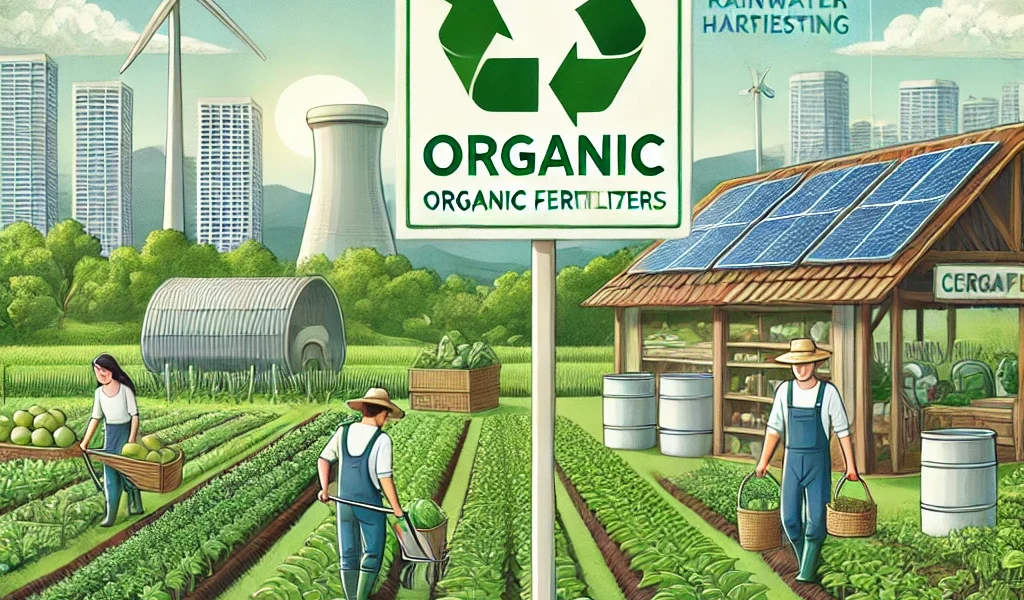Organic Certification: How Farmers Can Get Financial Aid for Organic Transition
Introduction
With growing awareness of health and sustainability, organic farming is becoming increasingly popular. However, the transition from conventional to organic agriculture requires significant investment in terms of certification, compliance, and sustainable farming practices. Recognizing this challenge, the Indian government offers several financial aid programs and subsidies to help farmers switch to organic farming.
In this guide, we will explore what organic certification is, why it is important, the key government schemes that support farmers in transitioning to organic farming, and how they can avail financial assistance.
What is Organic Certification?
Organic certification is a process that verifies that agricultural products have been grown and processed according to a set of sustainable, chemical-free farming standards. In India, organic certification is regulated under the National Programme for Organic Production (NPOP) and is mandatory for farmers who want to sell organic products under an official label.
Benefits of Organic Certification:
✅ Higher Market Value: Certified organic products fetch premium prices in domestic and international markets. ✅ Consumer Trust: Certification assures buyers that the produce is free from synthetic pesticides and fertilizers. ✅ Access to Government Incentives: Farmers with certification can access subsidies and financial support. ✅ Export Opportunities: Certification allows Indian farmers to export organic products to international markets.
Government Schemes Supporting Organic Farming Transition
1. Paramparagat Krishi Vikas Yojana (PKVY)
- Objective: Encourage farmers to adopt traditional, chemical-free farming methods.
- Key Benefits:
- Financial assistance of ₹50,000 per hectare for organic farming promotion.
- Support for organic input production (biofertilizers, composting, vermiculture).
- Farmers get ₹31,000 per farmer for certification and training.
- How to Apply?
- Farmers can apply through State Agricultural Departments or local Krishi Vigyan Kendras (KVKs).
2. Mission Organic Value Chain Development for North Eastern Region (MOVCDNER)
- Objective: Promote organic farming in the North-Eastern states.
- Key Benefits:
- ₹25,000 per hectare for organic conversion.
- Support for certification, branding, and marketing of organic produce.
- Assistance in organic input procurement and value chain development.
- How to Apply?
- Applications can be submitted through State Agricultural Departments in the North-East region.
3. National Programme for Organic Production (NPOP)
- Objective: Ensure standardization and certification of organic products in India.
- Key Benefits:
- Financial aid for small and marginal farmers to get organic certification.
- Subsidized rates for testing, verification, and accreditation of organic farms.
- Training and technical assistance for sustainable farming methods.
- How to Apply?
- Farmers can apply through the Agricultural and Processed Food Products Export Development Authority (APEDA).
4. Rashtriya Krishi Vikas Yojana (RKVY)
- Objective: Provide financial assistance for innovative agricultural projects, including organic farming.
- Key Benefits:
- Grants and subsidies for organic farm infrastructure development.
- Support for organic input production units and certification costs.
- Financial aid for marketing and branding of organic produce.
- How to Apply?
- Applications can be made through State Agricultural Departments and NABARD.
5. Pradhan Mantri Formalization of Micro Food Processing Enterprises (PMFME)
- Objective: Strengthen micro food processing units, including organic produce processing.
- Key Benefits:
- 35% subsidy (up to ₹10 lakh) for organic food processing enterprises.
- Funding for organic packaging, branding, and market linkages.
- Training for farmers in value addition of organic produce.
- How to Apply?
- Applications can be submitted through the PMFME portal or MSME offices.
How to Apply for Organic Farming Financial Aid?
Step 1: Choose the Right Scheme
- Identify the most suitable scheme based on your farming location and requirements.
- Check eligibility criteria and required documents.
Step 2: Prepare Necessary Documents
- Aadhaar Card / Farmer ID
- Land Ownership / Lease Agreement
- Organic Farming Project Proposal
- Bank Account Details
Step 3: Submit Application
- Apply through the relevant government portals (APEDA, NABARD, State Agricultural Department, etc.).
- Approach banks for subsidized loans under these schemes.
Step 4: Approval and Fund Utilization
- Once approved, funds will be disbursed directly to your account.
- Implement organic farming as per scheme guidelines.
Challenges in Organic Certification and How to Overcome Them
🚧 High Certification Cost: Government subsidies help reduce expenses, and farmers can also form Farmer Producer Organizations (FPOs) to share costs. 🚧 Lengthy Transition Period: It takes 2-3 years to convert farmland to organic; using natural soil enhancers and crop rotation can speed up the process. 🚧 Market Access Issues: Joining organic cooperatives and e-commerce platforms can improve visibility and sales. 🚧 Lack of Awareness: Enrolling in government-supported organic training programs can help farmers gain technical expertise.
Future of Organic Farming in India
With increasing consumer demand for organic products, the future looks bright for organic farming in India. Government support, financial incentives, and growing awareness will help farmers transition successfully. By taking advantage of these government schemes, farmers can achieve higher profitability, sustainability, and global market access. 🌱🚜🌍
If you’re a farmer looking to switch to organic farming, now is the right time to explore financial aid and certification benefits! ✅




